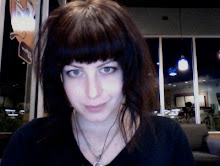Wednesday, March 4, 2009
Werewolf. Therewolf.
Freud was the first to suggest that the human brain contained something he called the "unconscious" and that it was "a repository of repressed desires, feelings, memories, and instinctual drives, many of which...have to do with sexuality and violence"(389). This plethora of repressed feelings could be channeled through dreams and could manifest themselves in people by showing signs of neurosis. The unconscious was something we all created internally through our first repressed act, which would have been, according to Freud's Oedipus Complex, the realization that our sexual desire for one parent was impossible, and not an acceptable feeling. That first repression, as it was referred to, would be the metaphorical sewing pattern for a huge bag of emotion that we would all end up carrying around with ourselves, whether or not we realized it.
CoCoRosie's song "Werewolf" deals heavily with a girl who was abandoned by her father at a young age, and spends her adult life helplessly searching for him, or some aspect of him to own. The song begins with the line "In a dream I was a werewolf", automatically drawing up the possibility for Freudian analysis of an unresolved Freudian complex. The band interweaves a narrative of sexuality, abandonment, and dream-like qualities to the scene they paint. Lines like "broken sun down, fatherless show down, gun hip, swollen lip, bottle sip, yeah I suck dick" are shocking to hear. It draws on Freud's idea of the Oedipus complex, and one's early suppressed desire to be sexually involved with the parent of the opposite sex. It's uncommon, and seems wrong, or offends our sense of morality, to hear a song that mentions someone's father and oral sex in the same line. But obviously the subject, because her father left, was never able to resolve the issues of the Oedipus complex and has unresolved sexual feelings towards the father figure that abandoned her. She speaks about her "schizophrenic father" and how she is "searching for {her] father's power".
Throughout the song she makes reference to the fact that her childhood was affected by the absence of a father. Lines like "evil doer doing evil from a baby carriage" and that he was "the bastard that broke up the marriage". All of this is represented through the telling of a dream that the subject is having, a dream that has now been interpreted as a repression of the pain that her father inflicted upon her when he left.
In the last full stanza, the speaker seems to be addressing a lover and her father at the same time. She sings that "I don't mean to close the door but for the record my heart is sore/you blew through me like bullet holes/ left stains on my sheets and stains on my soul" and then later refers to a stranger she sees in her dream as having "your hands and my fathers face". This type of sexual relationship, where a person has specifically chosen someone because of their similarities or resemblance to a parent can be a manifestation of an Oedipal complex that was never resolved at all. And how could it have been, when she was left without a father? Now, as an adult, she is choosing lovers who remind her of her father and who "blow through her", or leave her, just as her father did to her mother.
Constantly throughout the song there are references to the dreams that the subject is having. This song could almost be dissected and put into a dialogue of a patient speaking to a therapist. It is full of Freudian symbolism -- the unresolved sexual feelings towards a father, the over-flood of emotions (sexual and violent) through the manifestation of bizarre dreams.
Work Cited
Rivkin, Julie and Michael Ryan. Literary Theory: An Anthology. 2nd ed. United Kingdom: Blackwell Publishing, 2004.
Subscribe to:
Post Comments (Atom)

No comments:
Post a Comment